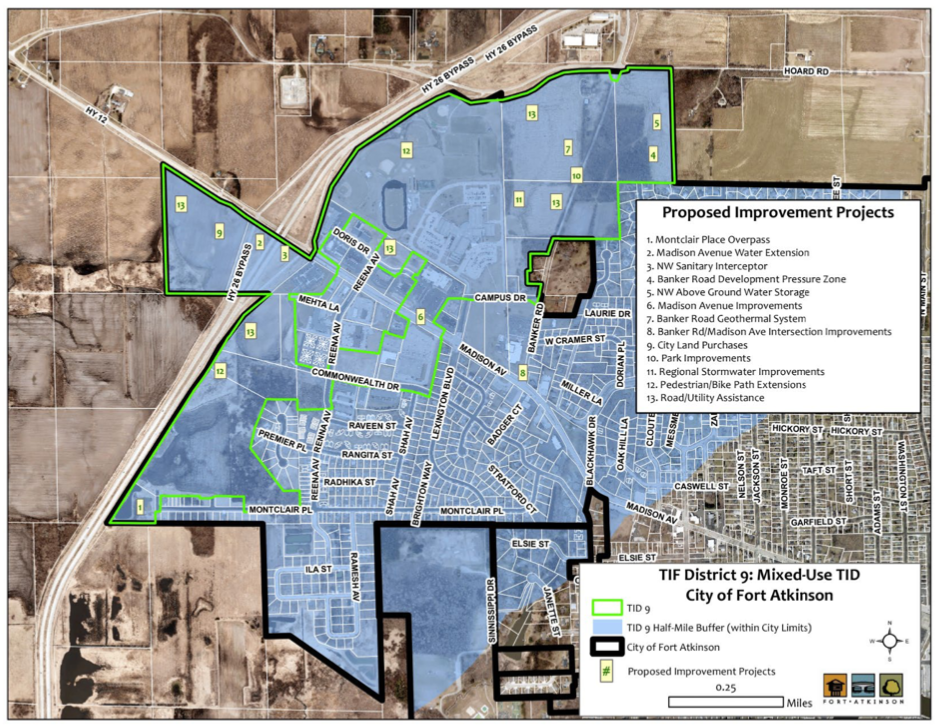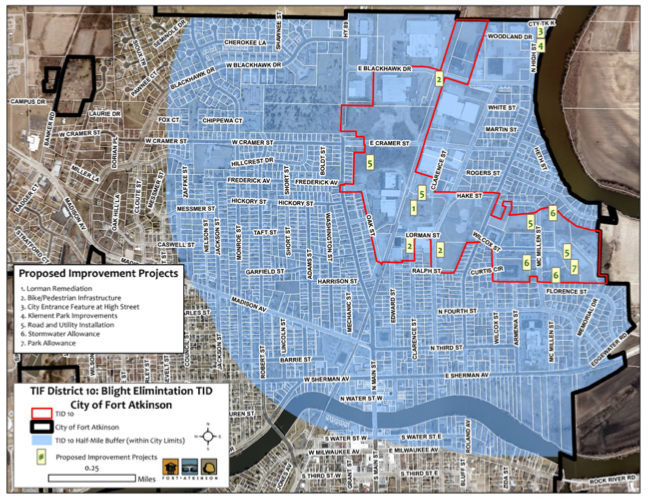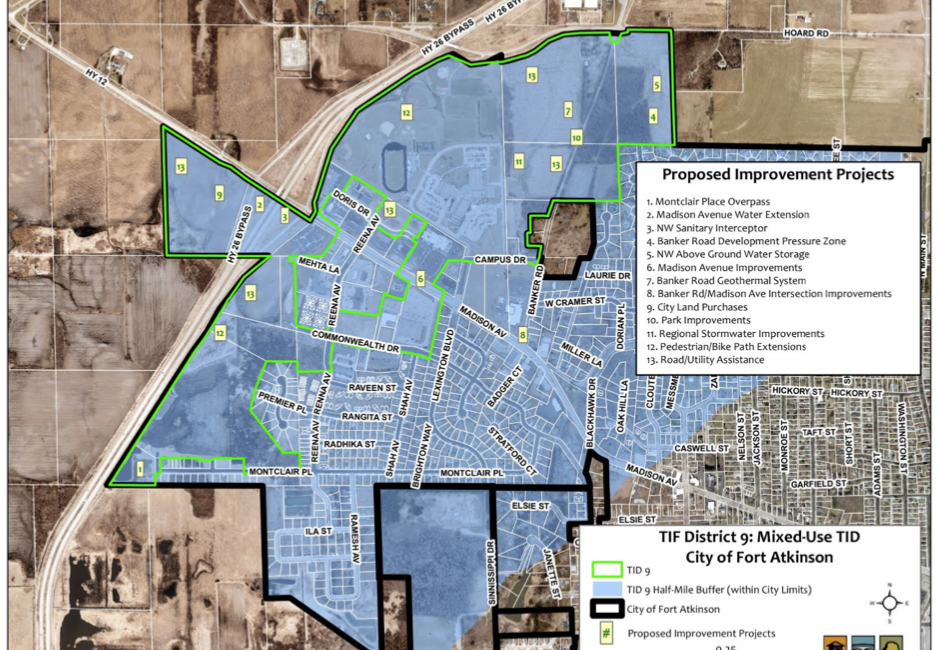Editor’s note: Following is the second of a two-part story about Tax Incremental Financing and districts under development in Fort Atkinson using the economic development tool. Part 1: Fort City Council receives ‘TIF 101’ refresher, is here: https://fortatkinsononline.com/fort-city-council-receives-tif-101-refresher/.
By Ryan Whisner
Plans for the creation of two new tax increment districts intended to assist and encourage development within the city of Fort Atkinson will be presented to the city’s Plan Commission on Sept. 27.
A detailed summary of the plans is available on the city’s website: https://www.fortatkinsonwi.gov. Following the Plan Commission’s recommendation, the city council will review the plans at its Oct. 18 meeting with final approval of the new districts being completed by the Joint Review Board on Nov. 1.
The Fort Atkinson City Council was presented with preliminary information during a TIF workshop prior to its Sept. 6 meeting.
Fort Atkinson City Manager Rebecca Houseman LeMire said the city is looking at two new tax increment districts. TID 9 would encompass an area along the northwest corridor of the community to allow the city to support the Banker Road development. TID 10 is intended to include multiple blighted properties in the northeast portion of the city, with hopes of spurring development on certain sites.
Tax incremental financing (TIF) is an economic tool or program used by a municipality to entice future development and expand its tax base.
Ultimately, the goal of the concept is to bring in value within that TID that wouldn’t be there had the TID not been created.
Property value is frozen in a TID. Tax revenue from any increase in value, called an “increment,” may be used to promote development. A municipality can spend or lend money for several purposes, including infrastructure, park improvements, bike paths, parking and direct financing for a development.
At the workshop on Sept. 6, council members appeared in favor of creation of the TIDs and what it could mean for the city going forward.
“I thought they were overall very good,” said council member Mason Becker, noting that he had read through the two plans. “I think we are fortunate we have two very successful TIDs and we have one that hasn’t been so much that everybody’s going to point to, I’m sure. I think we’re building upon a very successful one and we’re addressing an area of the city that has needed to be addressed for a long time so I’m excited about this.”
Council member Megan Hartwick also was optimistic about the process, but wanted to maintain a careful eye on how it proceeds.
“I think my ongoing question really, but more just things to keep in mind, is what is that balance between development happening and community expecting to see a change in your taxes because of that development,” she said.
LeMire noted that the city currently has three “active” TID districts, numbers 6, 7 and 8.
TID 6 is the Robert L. Klement Business Park on the south side of the city. Created in 2000, she said the expenditure period for the district has closed and it has been considered distressed for some time due to lack of development.
TID 7 is a downtown blight elimination district, and TID 8 is a mixed-use district that served the city’s northwest corridor development. Both TIDs 7 and 8 donate funds to pay off the debt related to TID 6. LeMire said the state allows successful TIDs within the same community to donate increment created in that TID to the other distressed TID to assist in paying down the debt.
Working with Baird, one of the city’s financial consultants, the target closure date for all three current TIDs is between 2025 and 2026. With the closure and subsequent creation of new TIDs, the anticipation is a minimal impact on the tax levy.
The proposed mixed-use district, labeled as TID 9, is partially an overlay of the existing TID 8, which means it does include some of the parcels that were included in TID 8 that are either underdeveloped or undeveloped in the city’s northwest corridor.
“The effect of that is when this new TID is created the current value of the parcel stays with TID 8 and any new value comes to TID 9,” the city manager said. “This one, we are looking specifically to assist and support Banker Road development as well as infrastructure needed to get to the other side of the Highway 26 bypass.”
As presented, TID 9 includes the Banker Road development, Crown of Life Christian Academy and Fort Atkinson High School properties and extends beyond the bypass with the recently annexed parcel currently owned by Fort HealthCare. The church and school-related properties are included to meet the state land area requirements. LeMire noted that per law, municipalities can only have 35% of a mixed use TID for newly planned single family residential development.
“We needed to make the whole TID a little bit bigger so that we could support the Banker Road development,” she said.
LeMire said there are 21 parcels totaling 267 acres with a base value of $22.8 million.
According to the plan, the city is proposing approximately $22 million in potential projects. Under TID law, the city can spend money on infrastructure projects within one half mile of the boundary of the TID if that’s included in the project, which it is. This means additional sidewalk installation or other projects may be able to proceed.
Projects mentioned in the plan document include an overpass of the State Highway 26 bypass at Montclair Place, extension of city water and sanitary sewer along Madison Avenue, Banker Road development pressure zone, a new water tower, improvements at Banker Road and Madison Avenue intersection, bike and pedestrian path extensions, road and utility installation land purchases and park improvements.
“Now those projects are estimates,” LeMire said. “We did write this with the intention of having flexibility in projects that we choose to pursue based on the development that’s proposed. I think it’s important to know that we’re not building anything (until) they come. We will be building things based on a development that is relatively certain.”
TID 10 has been identified as a blight elimination district on the northeast side of the city. All property owners have been notified of the area being identified as a blight elimination district.
“I would note that it certainly does not mean that every parcel in this area is so,” LeMire said.
The district does not include the Fort Atkinson hospital campus, but does include some of its outlying facilities, which could be part of their future expansion to remain in the current location. In addition, it includes the former Thomas Industries building, owned by DB Oak Limited Partnership, which was damaged in a fire in August 2021. The owner has expressed interest in rebuilding the portion of the building that was destroyed.
The district also will include the former Loeb-Lorman scrapyard site, which is owned by the city, and the former W.D. Hoard and Sons printing facility, which is slated to be redeveloped into the new BASE headquarters.
Combined, there are 33 parcels for a total of 120 acres with a $22 million value and a total of $13.3 million in projects.
Remediation at the Lorman site, bike and pedestrian infrastructure, a city entrance feature at High Street, Klement Park improvements, road and utility installation, and general infrastructure and park improvements are on the project list.

A graphic, as supplied within a proposal recently shared with the Fort Atkinson City Council to create TID 9, shows the area that would be included within the mixed-use district. The full proposal is here: http://fortatkinsononline.com/wp-content/uploads/2022/09/9.13.22-Draft-2-TID9-Project-Plan-Fort-Atkinson.pdf.

A graphic, as supplied within a proposal recently shared with the Fort Atkinson City Council to create TID 10, shows the area that would be included within a blight elimination TID. The full proposal is here: http://fortatkinsononline.com/wp-content/uploads/2022/09/9.13.22-Draft-2-TID10-Project-Plan-Fort-Atkinson.pdf.
This post has already been read 3077 times!
